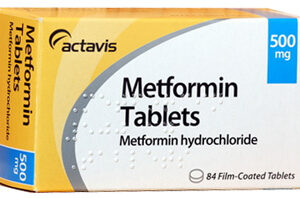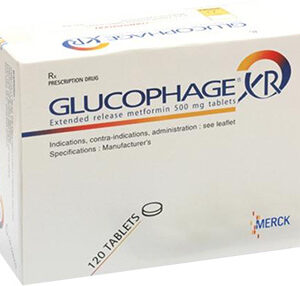Overview
Glucophage, containing metformin hydrochloride as its active ingredient, falls within the class of oral antihyperglycemic agents known as biguanides. It is primarily employed in the management of type 2 diabetes mellitus to improve glycemic control in adults and children 10 years of age and older, either as a monotherapy or in combination with insulin or other antidiabetic agents.
Indications & Usage
Glucophage is indicated for patients with type 2 diabetes when diet and exercise alone do not suffice to control blood sugar levels. Its use supports the reduction of both basal and postprandial plasma glucose. It is not indicated for the treatment of type 1 diabetes or diabetic ketoacidosis.
Dosage & Administration
The dosing of Glucophage should be individualized based on both effectiveness and tolerance while not exceeding the maximum recommended daily dose. Initiation of therapy typically begins with 500 mg taken orally twice a day or 850 mg once daily, with gradual dose escalation to minimize gastrointestinal side effects. The maintenance dosage ranges from 2000 to 2550 mg per day, given in divided doses. Renal function should be assessed before initiating therapy and periodically henceforth to determine the appropriate dosage.
Contraindications
Glucophage should not be used by individuals with renal disease or dysfunction, acute or chronic metabolic acidosis, including diabetic ketoacidosis, or known hypersensitivity to metformin hydrochloride. Caution is advised for those with conditions associated with hypoxemia, dehydration, sepsis, or excessive alcohol intake.
Warnings & Precautions
Treatment should be undertaken with caution to prevent the rare but serious condition of lactic acidosis. The risk increases with factors such as renal impairment, sepsis, dehydration, high alcohol intake, hepatic impairment, and acute congestive heart failure. The presence of such conditions should prompt immediate reassessment of the benefits and risks of continuing therapy. In elderly patients, renal function should be monitored more frequently due to the potential decline in kidney function as part of the aging process.
Adverse Reactions
Common adverse effects include gastrointestinal disturbances such as diarrhea, nausea, vomiting, flatulence, indigestion, abdominal discomfort, and anorexia. These side effects are often transient and can be mitigated by taking Glucophage with meals. Extended-release formulations may help to minimize gastrointestinal symptoms. Metformin has been associated with a decrease in vitamin B12 absorption which could lead to deficiency states if Glucophage is used long-term.
Drug Interactions
Certain medications when used concomitantly with Glucophage may need careful monitoring. For instance, cationic drugs eliminated by renal tubular secretion have the potential for interaction. Iodinated contrast agents used in radiologic studies may also increase the risk of lactic acidosis and should be used with caution. It’s important to review a patient’s medication regimen to identify possible interactions and adjust dosage accordingly.
Use in Specific Populations
Pregnant women should only use Glucophage if the potential benefits justify the potential risks to the fetus. Though studies have shown no adverse effects on the newborn, careful glucose control in expectant mothers is essential. For nursing mothers, a decision should be made whether to discontinue the drug or discontinue nursing. Caution is necessitated when administering to pediatric patients, with the lowest effective dose being the goal for treatment and careful monitoring for growth and development.
Overdosage
An overdose of Glucophage can result in lactic acidosis, which is a medical emergency requiring immediate treatment. Hemodialysis may be useful for removal of accumulated drug and can lead to a rapid improvement in the patient’s condition due to the sizeable extrarenal clearance of metformin.
Pharmacology
Metformin hydrochloride operates by inhibiting hepatic glucose production and increasing insulin sensitivity in muscle, leading to improved peripheral glucose uptake and utilization. Unlike sulfonylureas, it does not produce hypoglycemia in either diabetic or non-diabetic individuals and does not cause hyperinsulinemia.
Clinical Studies
Extensive clinical trials have demonstrated the efficacy of Glucophage in lowering both basal and postprandial plasma glucose. It has been shown to be effective in obese and non-obese patients and those who lack adequate glycemic control after diet and exercise.
How Supplied/Storage & Handling
Glucophage tablets are supplied in various strengths and forms, including 500 mg, 850 mg, and 1000 mg. Store at room temperature away from moisture and heat. The container should be kept tightly closed in order to protect from moisture. Unused medication or expired drugs should be disposed of in accordance with local requirements.
Patient Counseling Information
Patients should be counseled on the importance of adhering to dietary instructions, regular physical activity, and regular blood glucose monitoring. They should also be informed about the potential for the onset of lactic acidosis, symptoms of hypoglycemia, and conditions that predispose to the development of this complication. Additionally, they should recognize that gastrointestinal symptoms are common during initial therapy and should typically improve over time.




Reviews
There are no reviews yet.